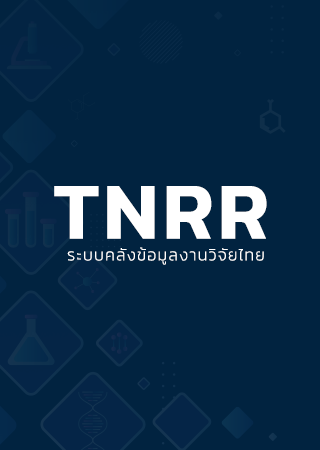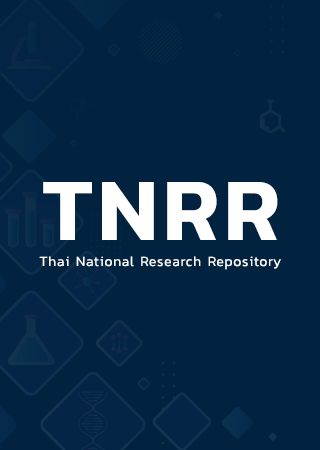Description
การระบาดใหญ่ของโรคโควิด 19 คาดว่าจะยังคงสร้างภาระให้กับการเจ็บป่วยและการเสียชีวิตอย่างมหาศาล การยอมรับวัคซีนเป็นพฤติกรรมในการป้องกันโรคแต่ยังมีคนมากมายที่เลือกที่จะไม่รับวัคซีน โดยทางภาคใต้ของประเทศไทยยังคงขาดแคลนงานวิจัยที่เข้าใจทัศนะในการยอมรับวัคซีนและปัจจัยที่มีผลต่อการยอมรับวัคซีนของกลุ่มเสี่ยง การวิจัยครั้งนี้จึงมีวัตถุประสงค์เพื่อ (1) อธิบายการยอมรับวัคซีนโควิด 19 (2) เพื่อประเมินความตั้งใจที่จะยอมรับวัคซีนโควิด 19 และ (3) เพื่อวิเคราะห์ปัจจัยที่มีความสัมพันธ์กับการยอมรับวัคซีนโควิด 19 การวิจัยนี้เป็นการวิจัยแบบภาคตัดขวาง รวบรวมข้อมูลด้วยวิธีการเชิงปริมาณและคุณภาพ กลุ่มตัวอย่างคือ พ่อค้าแม่ค้า ผู้สูงอายุ ผู้ป่วยโรคไม่ติดต่อเรื้อรัง แรงงานต่างด้าว และหญิงตั้งครรภ์ ในภาคใต้ ใช้วิธีการสุ่มตัวอย่างอย่างง่าย โดยเก็บข้อมูลเชิงปริมาณด้วยแบบสอบถาม จำนวน 1,246 คน และรวบรวมข้อมูลเชิงคุณภาพด้วยการสัมภาษณ์ จำนวน 40 คน วิเคราะห์ข้อมูลด้วยสถิติ จำนวน ร้อยละ ไคสแควร์ การถดถอยโลจิสติค และการวิเคราะห์เนื้อหา ผลการวิจัยจากการสัมภาษณ์พบปัจจัย 3 ประการที่มีผลต่อความตั้งใจที่จะรับวัคซีนโควิด 19 ภายใน 1 ปี ดังนี้ (1) ปัจจัยส่วนบุคคล บุคคลที่มีความตั้งใจที่จะรับวัคซีนคำนึงถึงการเดินทางได้สะดวก ได้รับการจ้างงานหรือหางานทำใหม่ได้ และการปกป้องตนเองและครอบครัว ในขณะที่ บุคคลที่ลังเลหรือไม่ตั้งใจที่จะรับวัคซีนรับรู้ถึงเงื่อนไขด้านสุขภาพของตนเอง การไม่ไว้ใจวัคซีนซึ่งเป็นสิ่งใหม่ และความเชื่อทางศาสนา (2) ปัจจัยระบบบริการ บุคคลที่มีความตั้งใจที่จะรับวัคซีนมีแนวโน้มที่มีทัศนคติที่ดีต่อบริการของรัฐ ในขณะที่บุคคลที่มีลังเลหรือไม่ตั้งใจที่จะรับวัคซีนขาดความเชื่อมั่นในผู้ให้บริการและหน่วยงานรัฐ และต้องการเลือกชนิดของวัคซีน (3) ปัจจัยด้านการสื่อสาร ข้อมูลที่ได้รับจากช่องทางต่าง ๆ จะเป็นได้ทั้งแรงจูงใจและลดความตั้งใจที่จะรับวัคซีน แรงจูงใจจากผู้อื่นที่อยู่ใกล้ตัวและความต้องการที่จะเข้าสังคมมีแนวโน้มที่เป็นแรงผลักดันทางบวก ในขณะที่ ข้อมูลจากสื่อทำให้เกิดความกลัวและเกิดความเชื่อเรื่องการทำลายล้างจึงมีแนวโน้มที่จะไม่ตั้งใจในการรับวัคซีนโควิด 19 กลุ่มเสี่ยงมีความตั้งใจรับวัคซีนโควิด 19 ภายใน 1 ปี คิดเป็น 66.6% ปัจจัยที่มีความสัมพันธ์กับความตั้งใจยอมรับวัคซีนโควิด 19 ได้แก่ (1) อายุ (2) การศึกษา (3) รายได้เฉลี่ย (4) สถานะทางการเงิน (5) ความเชื่อมั่นว่าระบบสาธารณสุขสามารถจัดการกับโรคโควิด 19 (6) การสวมใส่หน้ากากอนามัย เมื่อออกนอกบ้าน/พบปะกับบุคคลภายนอก (7) การรับรู้ถึงประโยชน์ของป้องกันโรค และ (8) สิ่งชักนำให้เกิดการปฏิบัติ ปัจจัยที่เป็นตัวทำนายความตั้งใจที่จะรับวัคซีนโควิด 19 มากที่สุด ได้แก่ สถานะทางการเงิน รายได้เฉลี่ยและการรับรู้ประโยชน์ของการรับวัคซีนโควิด 19 ตามลำดับ ดังนั้น หน่วยงานสาธารณสุขควรดำเนินการให้กลุ่มเสี่ยงมีความรู้ความเข้าใจเกี่ยวกับวัคซีนโดยอาศัยการสื่อสารที่มีประสิทธิภาพควบคู่ไปกับการพัฒนาระบบบริการสาธารณสุขคำสำคัญ : การยอมรับ, วัคซีน, โควิด 19, กลุ่มเสี่ยง<br><br>AbstractThe COVID-19 pandemic is predicted to continue causing a huge morbidity and death impact. Vaccination adoption is a protective action, yet many people choose not to be vaccinated. In the south of Thailand, there is still a dearth of research on vaccination acceptability and the factors that influence vaccine acceptance among at-risk populations. The studys aims were to (1) describe COVID-19 vaccine acceptance, (2) assess willingness to take the COVID-19 vaccination, and (3) examine variables associated with COVID-19 vaccine acceptance.This study used a cross-sectional research approach. Data was gathered employing both quantitative and qualitative techniques. Using a simple random sampling method, the sample group consisted of merchants, the elderly, patients with chronic non-communicable diseases, migrant workers, and pregnant women in the south. Quantitative data were gathered by surveys distributed to 1,246 respondents, while qualitative data was gathered through interviews with 40 persons. The data was used to examine the frequency, percentage, chi-square, logistic regression statistics, and content analysis.The interview data indicated three factors that influence the intention to take the COVID-19 vaccination within a year, as follows: (1) Personal factors - individuals who intend to be vaccinated. They consider the ease of travel, obtaining employment or finding a new job, and protecting themselves and their families. In contrast, those reluctant to receive vaccines are aware of their health conditions, distrust new vaccines, and have religious beliefs. (2) Service system factors - individuals who intend to vaccinate have a positive attitude toward government services. Individuals who are hesitant or unconcerned about receiving vaccinations, on the other hand, lack trust in physicians and government agencies and wish to choose the type of vaccine. (3) Communication factors – information obtained through various channels can both motivate and deter people from getting vaccinated. Motivations from those around and a desire to be sociable are positive drivers, but media information fosters dread and damaging ideas, making it difficult to obtain the Covid-19 vaccination.Sixty-six percent of risk groups want to receive the COVID-19 vaccination within a year. The following factors are associated with readiness to receive the COVID-19 vaccine: (1) age (2) education (3) average income (4) financial status (5) belief that the health system can handle COVID-19 (6) wearing a mask when going out/meeting with strangers (7), perceptions of the benefits of disease prevention, and (8) things that stimulate action. In that order, financial condition, average income, and perceived benefits of COVID-19 immunization were the most predictive of intent to receive the COVID-19 vaccine. As a result, public health organizations should ensure that at-risk populations understand vaccinations better through effective communication by developing the healthcare system.Key words: Acceptance, Vaccine, COVID-19, Risk Groups
Date of Publication :
02/2023
Publisher :
สำนักงานการวิจัยแห่งชาติ (วช.)
Category :
รายงานการวิจัย
Total page :
77012 pages
People Who Read This Also Read


